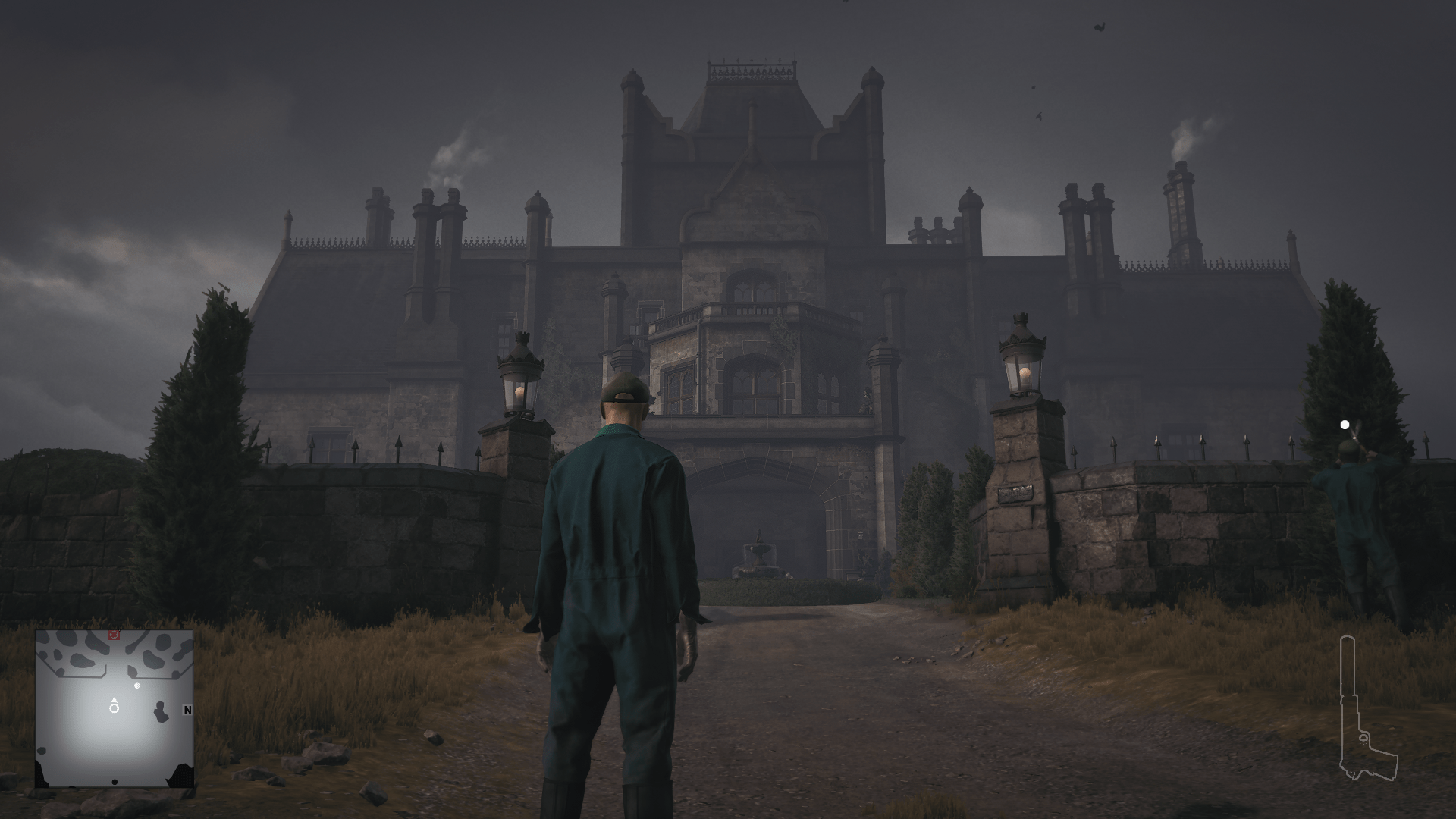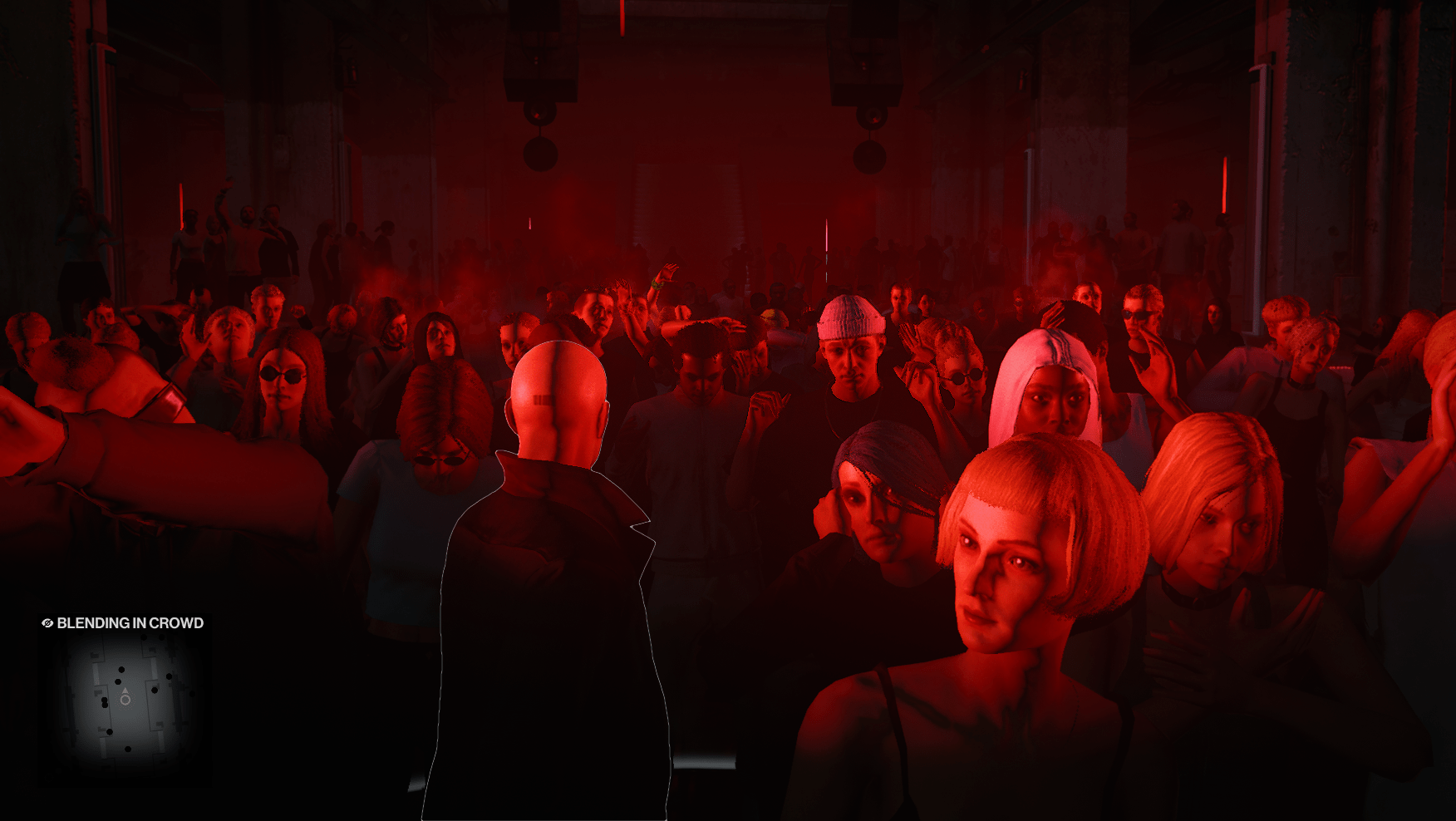Hitman 3 made me care more about its plot than crafting the perfect murder. The narrative, which I usually see as a flimsy excuse to play dress-up and cause globe-spanning mayhem, bleeds into the structure of its levels and creates some unexpected moments of emotion and vulnerability. Its dark story plays with the lie at the heart of Hitman’s gameplay: Agent 47 can easily slip into the life of a waiter, or a musician, or a model, but who is he really, and who, if anyone, does he want to be?
Hitman has always been a weird blend of humour and darkness, a series where an end-of-mission score lures you toward perfection while the game itself lets you bumble around doing whatever you want. It’s hilarious and satisfying to drown a target in a toilet after they get sick off food you poisoned, or watch their body fly into the air after they strike an exploding golf ball you planted. But that stands alongside the fact that, as Agent 47, you play as a cruel, dishonest man who will kill whoever he’s told to further the interests of the powerful, shadowy figures who call the shots. Hitman games feel classier than might be imagined if you explained their title and premise to someone who doesn’t play games, but their stealth elegance covers up what is, at its core, an ugly fantasy of power and violence. They make me feel smart, but the pleasure I find in them feels gross to justify.
Developers at IO Interactive have called Hitman 3 the end of the modern trilogy, and as such, they seem to face these contradictions of the series head on in this game, stripping away characters’ justifications and forcing them to take an honest look at themselves and their actions. For a lot of the game, I didn’t lose myself in a Hitman fantasy of parties, mastery, and bloodshed. I felt distinctly like I was playing as Agent 47, with all the pain and darkness someone who lives in a world of murder would inevitably bring crashing down on themselves.

I’m not going to spoil any of it for you; I wouldn’t, even if I could. PR for IO Interactive provided us with full code about a week before launch. In exchange, I agreed not to discuss any major plot details, nor any specifics about a murder mystery subplot in the game’s second location, Dartmoor. There’s plenty to talk about without getting into spoilers, though, and I’m eager to hear what other players think of the game’s story and how they solved its many challenges once the game launches on Wednesday.
Hitman 3 begins where Hitman 2 left off, with Agent 47 and his childhood friend Lucas Grey closing in on the Partners and the mysterious Constant who was the force behind the action of Hitman 2. Usually, Hitman plots don’t interest me much, too full of acronym-laden agencies and references to series events of which I only have the faintest grasp. That’s here too, but the story quickly becomes about the relationships characters have with one another, how they feel about what they’re doing, and how long they can live with how it feels to do it. In gameplay, Agent 47 is still the blank slate he’s always been, who can capably do any job and fit admirably into any pair of pants. But I found myself playing an angrier, messier 47 as well. Moments when I felt clever or powerful didn’t feel as good as they usually do; they felt more like the lies they’ve always been. Sometimes, I didn’t care about doing things well; I just wanted to get things done.
Hitman 3 has six levels. The game feels small and focused, with less of the narrative contortions Hitman usually employs to find an excuse to jetset you around the world. But most levels took me longer to complete than I’m used to, either through lengthy story missions or because it took me a long time to get my bearings in complicated areas with lots of pieces. The opening level of Dubai and the vineyard in the fourth level of Argentina felt the most like the levels I know and love from the modern Hitman games: glamorous locations full of secrets and disguises, where I could enjoy dressing up in fancy clothes and eavesdropping on insufferable rich people. They’re largely the glitzy playgrounds full of possible accidents that I’m excited to replay to see how far I can push them.

Many story missions are more complex than they’ve been in the past. One in the China level ended with an intriguing puzzle that I made even more complicated for myself by overthinking it. A story mission I chose in Argentina made the plot of the level go very differently for me than a colleague who chose different options, though we both got the same narrative result. The murder mystery in Dartmoor, the second level, is by far the most involved, giving 47 almost full run of a huge, stately mansion and the obligation, in the guise of a detective, to go snooping around everyone’s business the way you’d usually do more covertly. The mystery itself didn’t quite grip me — the characters are fun, but there are a lot of them, and I found the stakes hard to become invested in given 47’s ultimate murderous goal. But it was an interesting, enjoyable twist on Hitman to actually get to know the people who populate a level, to become familiar with their emotions and motivations instead of just their patrol patterns.
[review heading=”Hitman 3″ image=”https://www.gizmodo.com.au/wp-content/uploads/sites/3/2021/01/20/y0vcztzpd4axqdr1drbu.png” label1=”Back of the box quote” description1=”I will leave you to prepare.” label2=”type of game” description2=”Agent 47 character study” label3=”liked” description3=”Exciting story, twists on the usual Hitman formula, lots of funny moments” label4=”disliked” description4=”In-game camera could be a little clunky, door codes and shortcuts didn’t feel like they added much” label5=”developer” description5=”IO Interactive” label6=”platforms” description6=”PC (played), Xbox, PlayStation, Switch, Stadia” label7=”release date” description7=”January 20, 2021″ label8=”played” description8=”Around 15 hours” ]
The camera, one of Hitman 3’s new tools, features heavily in Dartmoor. Throughout the game, you use it to scan for clues indicated by an icon on the minimap, which will give you intel on people or locations. Scanning some locks in levels can open them, though the option arose less than I expected. I found the camera a bit finicky; it could be hard to tell exactly what my map icon was guiding me toward, which was annoying when scanning the right object was necessary to progress a story mission. It wasn’t as robust a tool as I’d imagine it to be, but it was, on occasion, fun to have in my arsenal.
There are also shortcuts, passageways barred from one side that become permanently opened once you unlock them. Some doors also require codes, which you type into keypads by hand, meaning you can’t use them for a quick escape. I found myself paying a lot more attention to the specifics of the environment than I usually do: parsing out exactly where a room might be in a building to see if there was another way in, or listening more closely to people around me who might be engaging in the stealth game tradition of loudly discussing secret codes. These are minor changes, and while I sometimes found them slightly more annoying than interesting, they encouraged me to relate to the game’s environments in a new way that emphasised Hitman 3’s departure from the rest of the series.

The story and mission format soon take a turn, and I felt off-balance for a lot of the game, even when levels like Argentina had a more familiar setup. I felt vulnerable and outmatched as I worked my way through a Berlin level, a crowded nightclub full of disorienting lighting and multiple targets who can see through every one of your disguises. My kills in the level were ultimately artless and desperate, visceral in a way I’m not used to in a Hitman game.
Things got messy for me in the later levels. In one, I resorted to grabbing a gun and simply mowing down the enemies in my way, a play that can feel like a cardinal sin in a Hitman game but felt like the right choice at the time. Other moments required me to act quickly or make a decision with whatever knowledge I had at hand rather than giving me the time to plan a more elegant approach. I forgot about trying to perfect my score, drawn into the moment more than all the Hitman meta that surrounds it. A lot of Hitman 3 feels violent and dangerous, strange for a game that’s usually leisurely and cerebral, but also fitting for the series’ story and world.

Perhaps as a result this narrative turn, Hitman 3‘s absurdity and humour stood out sharply as a welcome contrast. While Hitman 3 is darker than previous games, there’s still a lot of quirky characterization and fourth wall-breaking moments. In one level, a character told another that the code to a door was a historically significant year, adding “shame on you” if they had to look it up, which paused me in real life mid-reach for my phone. In an action-heavy late-game mission, a soldier I passed while disguised asked me if I’d bring him a soda on my way back, which felt surreal and hilarious given the absolute carnage I’d left just out of his view. While blending in in China, a woman standing next to 47 asked him for advice about a personal situation, and they had an adorable conversation before 47 got back to murdering. Berlin’s loneliness was alleviated by a dorky raver who showed me around the level, making heavy-handed references to “vitamins” and “allergy pills” until I wished I had the option to slap him.
Even when I was on familiar ground — ”safe” in my disguise, surrounded by pretentious and gullible targets, armed with all my secret gadgets and intel — I felt aware of who 47 actually is: lonely and out of place, with few friends and little control over his life. Whatever humanity he might have is twisted up in the machinations of power and capital that he’s both part of and fights against. “Who will you be without a score to settle?” Lucas Grey asks him early in the game, and it’s a question I often turned over as Hitman 3 played out. Essentially, he’d be no one — but then he’s always been that, really; all the rest of his identity is just make believe. Narratively and structurally, Hitman 3 strips its own make believe away, leaving the series’ core darkness on display.

Leave a Reply